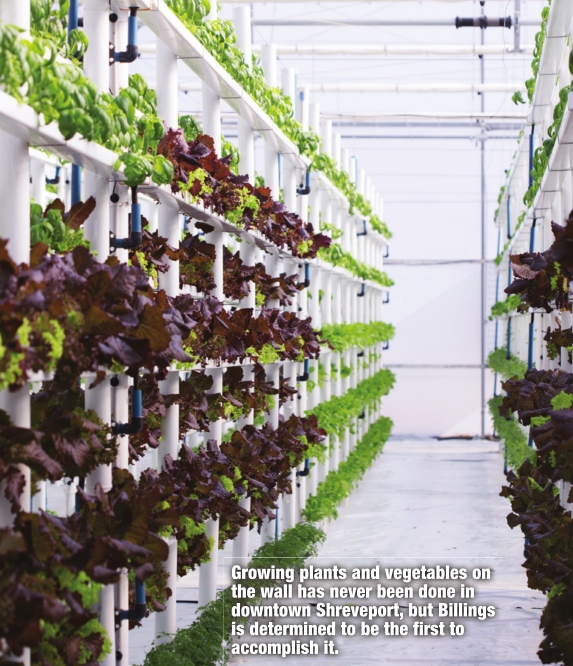Cotton Street Farms

Fresh produce grown in the heart of downtown
Downtown Shreveport is home to many attractions which make living in the heart of the city appealing – apartments, restaurants, coffee shops, casinos and a farm.
A farm? Yes. A farm. An indoor farm. – a top-five finalist last year and an entry in this year’s Louisiana Start Up Prize competition – is the brainchild of Michael Billings, a 35-year-old graduate of Caddo Magnet High School. Billings has bought a vacant building at 406 Cotton St. Along with his business partner, Brittany Turner, Billings is turning the space once cluttered with high-speed cables and rows of electronic servers into, well, an indoor farm.
“It’s quirky and different, and we love it because it’s quirky and different,” said Liz Swaine, executive director of the Downtown Development Authority. “When he first came to me and said, ‘Hey, I want to have a farm in the middle of a historic building in the middle of downtown,’ I thought, ‘Well, that’s odd.’ How can that even work?” Here’s how. The scientific name for growing food indoors is vertical hydroponics. Billings says think of it this way: “If you were to plant in a rain gutter a bunch of plants, then tip that rain gutter vertically, and then let them continue to grow horizontally.”
So that’s the “How?” Here’s the “Why?” “By growing (food) indoors, I can avoid a lot of the pesticides and herbicides and fungicides,” Billings explained. “By using the latest technology of computers, sensors and LED lights, I can shorten the growth cycle to six to eight weeks. I can grow a lot of vegetables, very clean and in a very fast time.”
The LED lights are what Billings calls the “secret sauce.” He will use 70 of them, at a cost of $1,200 each.
“The LED lights are designed to mimic the sun,” Billings explained. “We can mimic the sun just about any place in the world at any season. I can dial down the frequency to the exact frequency that plant grows the best at. It allows me to provide them the light 24 hours a day, with the exact type of light they need, as opposed to growing outside; you’re limited to the daytime. And there are even certain parts of the daytime that are optimal for the plant. I get to expand that. That’s why they grow so quickly.”
 Until the first batch of food is ready to be sold, Cotton Street Farms is selling produce grown at DixieMaze Farms – owned by Billings’ father and stepmother. Squash, cucumbers, cantaloupe, watermelon and a lot more can be bought downtown – or delivered to you.
Until the first batch of food is ready to be sold, Cotton Street Farms is selling produce grown at DixieMaze Farms – owned by Billings’ father and stepmother. Squash, cucumbers, cantaloupe, watermelon and a lot more can be bought downtown – or delivered to you.
“I just think what he has come up with and his foresight in seeing the options, it’s just remarkable,” Swaine said.
“We’re thrilled to have him as a neighbor in downtown.”
It’s no accident Billings established his business downtown. He saw a need and felt a calling to satisfy that need.
“Currently, I think it’s a mile and a half in every direction, at a minimum, before you can buy produce downtown,” Billings said. “There’s a huge population of downtown people who don’t have transportation. There’s several thousand who will be moving into apartment buildings nearby, so this will very much solve the downtown food desert problem.”
Swaine couldn’t agree more. “To have this option currently with the Farmer’s Market going on, having this option six days a week is tremendous for downtown residential,” she said. “To be able to go into this building and purchase farm-to-table fresh produce and fruit is remarkable. I am so happy that he not only saw the need and had the desire to do the farming aspect, but also to open it up so people can come down there and share in his fresh food bounty.”
But Billings wants to do more, like setting up hydroponic farms at area schools.
“The food that our children are eating is the same grade or worse than prisons,” Billings said. “It’s horrible. It’s about the lowest grade quality food you can buy, and that’s what we give our children. It’s not because the schools are bad people – they just don’t have funding. We want to help solve that problem.”
Billings’ desire to make a difference simmered and came to a boil in West Texas. He was “making an enormous amount of money” selling tires to oilfield companies for use on their many semi-trucks.
“Financially, I was in a really good place, living in an awful part of the nation. Dry, dusty, oily and dirty. One day I came to the realization that while I was making money and my money could help people, as a person I was doing very little for my community. My life work didn’t amount to a legacy of service, and that’s what we were taught growing up – you serve your neighbor.”
And by doing something as unconventional as nurturing a downtown indoor farm, Billings hopes to do something noble.
“The idea isn’t just to grow vegetables, but to grow the community. We want people to eat better, eat healthier and live healthier as well. It’s very much our model that we don’t just come into a community to sell produce. We come into a community to grow it – to make it a little bit better.”
To learn more about Cotton Street Farms, you may visit www.cottonstfarms.com.
– Tony Taglavore
Photography by M.C. Rollo
